When you plan a kitchen or bathroom, the sink choice matters. Two popular types are undermount sinks and drop-in sinks (also called top-mount). Each has strong points. Each has trade-offs. This guide explains both in simple words. By the end you will know which one fits your home and budget.
What is a Drop-In Sink?
A drop-in sink drops into a hole in the countertop. It has a rim that sits on top of the counter. Installers cut a hole. Then the sink is placed from above. The rim rests on the counter. Sealant is added around the rim to stop water.
Pros of Drop-In Sinks
-
Easy to install. Good for DIY.
-
Works with many countertops, even thin or low-cost ones.
-
Often cheaper than undermount sinks.
-
Easy to replace without big work.
Cons of Drop-In Sinks
-
The rim can collect dirt and grime.
-
It can look less sleek than an undermount.
-
Water and crumbs can get trapped at the edge.
-
Some designs look bulky on certain countertops.
What is an Undermount Sink?
An undermount sink is fixed under the countertop. The counter edge covers the sink lip. This gives a smooth look. It makes cleaning the counter easier. You can wipe crumbs straight into the sink.
Pros of Undermount Sinks
-
Smooth, modern look. No visible rim.
-
Easier to clean. Wiping crumbs into sink is simple.
-
Often a higher-end appearance.
-
Better for solid surface counters like granite, quartz, or marble.
Cons of Undermount Sinks
-
Installation is harder. It needs strong support and skill.
-
Usually costlier than drop-in sinks.
-
Not ideal for thin or laminate counters unless reinforced.
-
If the seal fails, water can get under the countertop.
Key Differences — Quick Comparison
-
Appearance: Undermount = sleek. Drop-in = visible rim.
-
Cleaning: Undermount = easier. Drop-in = needs more care at rim.
-
Installation: Undermount = professional, needs support. Drop-in = easier.
-
Cost: Undermount = higher (sink + installation). Drop-in = often cheaper.
-
Countertop Type: Undermount = best with solid slabs (stone, quartz). Drop-in = works with many materials.
-
Repair/Replace: Drop-in = easier to swap out. Undermount = harder to remove.
Which Countertops Work Best?
-
Granite, Quartz, Marble: Best with undermount sinks. The stone is strong enough to hold the sink.
-
Laminate, Butcher Block, Thin Tiles: Better with drop-in sinks. Laminate can be damaged if undermount is installed wrong.
-
Solid Surface (e.g., Corian): Can work with both, but check manufacturer rules.
Cost Breakdown (Simple)
-
Drop-in sink price: Low to medium (many budget models exist).
-
Undermount sink price: Medium to high (premium models common).
-
Installation: Drop-in = lower installation cost. Undermount = higher labor cost because of mounting and sealing work.
-
Countertop work: If you change sink type, you may need new countertop cutting or reinforcement, which adds cost.
Cleaning & Maintenance Tips
-
For drop-in sinks, clean the rim daily. Use a soft brush to remove grime between the rim and counter.
-
For undermount sinks, check the seal under the sink twice a year. Re-caulk if you see gaps or leaks.
-
Use non-abrasive cleaners on both types. Harsh scrubbing can dull finish.
-
For stainless steel sinks, dry after heavy use to avoid spots.
-
Avoid letting water sit on wood countertops near undermount sinks. Seal wood well.
Durability & Long-Term Issues
-
Drop-in sinks: The rim is exposed to spills. Over time grime can collect and look worn. But these sinks are easy to replace.
-
Undermount sinks: The seal and mount are key. If poorly installed, the sink may separate or leak under the counter. A good installer prevents this.
Aesthetic & Design Considerations
If you want a modern, seamless look, undermount wins. It blends with stone countertops and looks high-end. If you want a classic or farmhouse vibe, drop-in sinks also come in great styles. Drop-ins can match traditional sinks and may include decorative rims.
Practical Use Cases — Which One to Pick?
-
If you want low cost and easy DIY: choose a drop-in sink.
-
If you use your kitchen a lot and care about easy cleaning: undermount is best. Wiping crumbs into sink is quick.
-
If you have granite or quartz counters: undermount looks better and fits well.
-
If your countertop is laminate or thin: drop-in is safer. Undermount can damage the counter.
-
If you plan to sell your house soon: undermount may add perceived value if paired with stone counters. But choose what matches your budget.
Installation Checklist
-
For drop-in:
-
Check sink rim fits counter hole.
-
Apply sealant between rim and counter.
-
Tighten clips under the counter.
-
-
For undermount:
-
Confirm countertop can hold sink weight.
-
Use proper mounting brackets or adhesive.
-
Seal edges carefully to prevent leaks.
-
Hire a pro if you are not experienced.
-
Environmental & Practical Notes
-
If you plan to change sinks in the future, drop-in offers easier swaps.
-
Undermount installation may need a solid slab countertop. That increases raw material use but also longevity.
-
Both sink types can be recycled depending on the material (stainless steel, cast iron, etc.).
Short FAQs
Q: Can I convert a drop-in sink to undermount?
A: It is possible but not always simple. You may need to replace or modify the countertop. A pro can advise if the countertop can be cut and supported.
Q: Which sink is best for small kitchens?
A: Undermount sinks save counter edges and give a neat look. That can make a small kitchen feel cleaner and less cluttered.
Q: Are undermount sinks harder to clean under the rim?
A: No — undermount sinks remove the rim, so there is less place for food to get stuck. But you must keep the caulk sealed.
Q: Which sink is better for heavy pots?
A: Both can handle heavy pots if the sink material and mount are strong. Make sure undermount sinks are well supported.
Final Recommendation
Both undermount and drop-in sinks have a place. Your choice depends on these main things:
-
Countertop type (stone vs laminate),
-
Budget (initial + installation),
-
Look you want (modern vs classic),
-
Ease of cleaning and care.
If you have stone counters and want a clean, modern look, pick an undermount sink and hire a pro for installation. If you want a lower-cost option that is easier to replace and works with many counters, pick a drop-in sink.
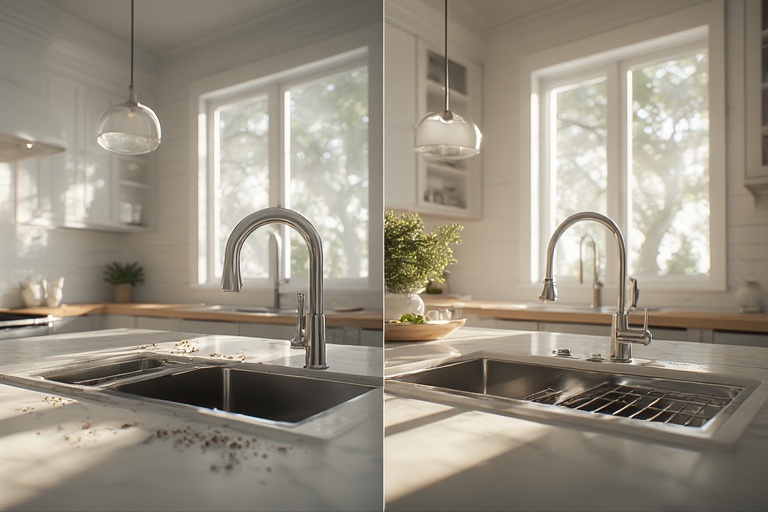
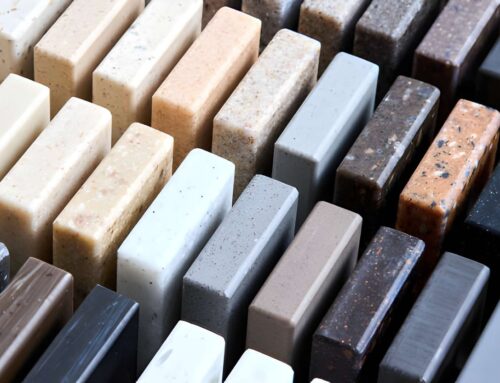
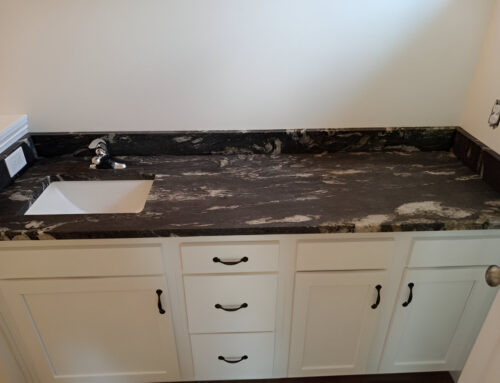
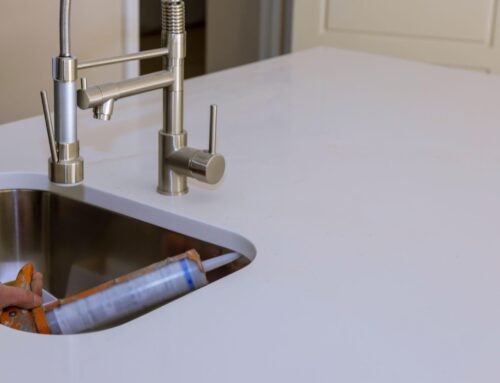
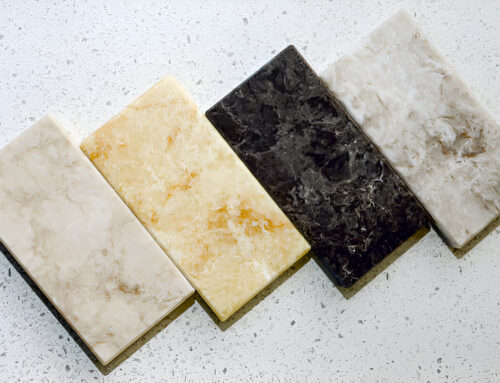

Leave A Comment